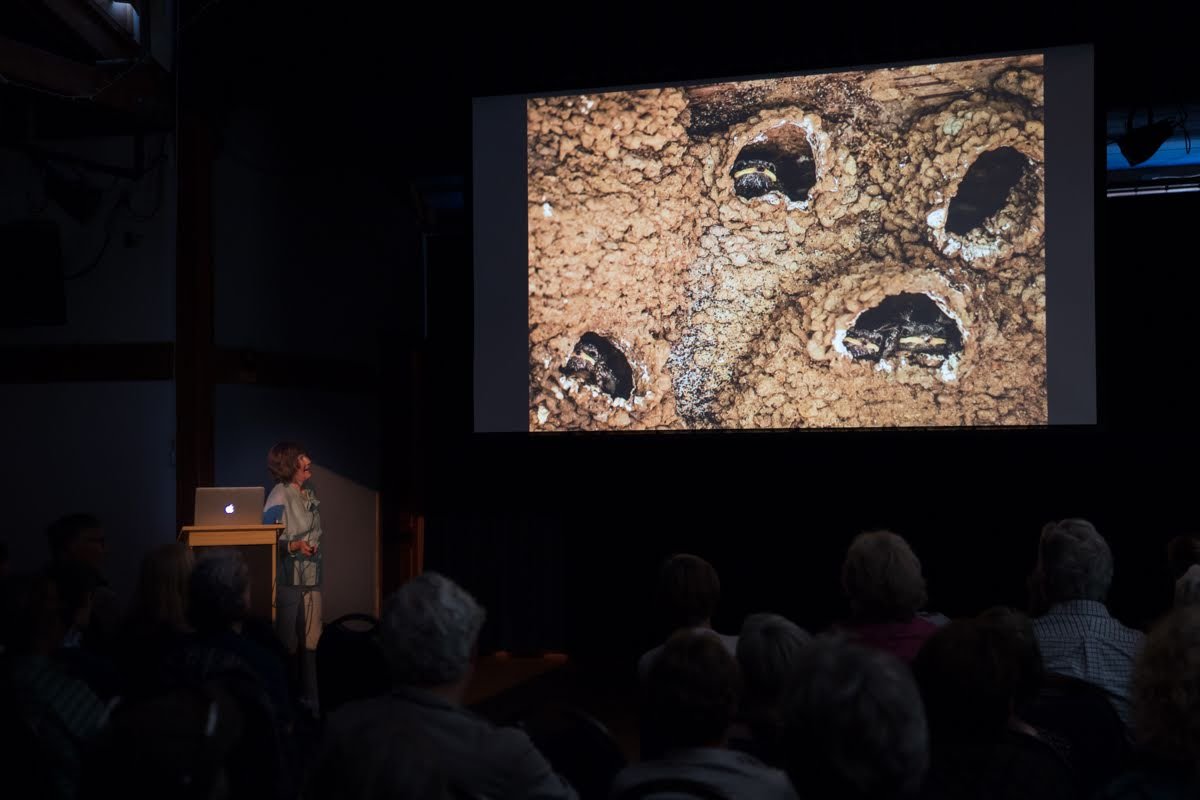Friday Fauna Forum: Apex Predators of Land & Sea
with the North Bay Living with Lions Program
& The California White Shark Project
April 25th, 2025 | 4:00 - 6:30 PM
Dance Palace Community & Cultural Center, Point Reyes Station, CA
Registration Event #19 | $65 per person
Recommended ages: 10+ | Dress trail chic, flat shoes, and warm wraps | Zero waste event
Dive into an unforgettable evening celebrating the fascinating apex predators of Marin's coastline! The night will kick off with:
Social Hour: 4:00 - 5:00 PM
Kick things off with a relaxed social hour with light refreshments, oysters, and refreshing non-alcoholic drinks while mingling with fellow nature enthusiasts. The social will include tables with:
Jeff Miller, a celebrated guide and advocate with the Center for Biological Diversity, will share his delightful new guidebook, Bay Area Wildlife: An Irreverent Guide—a treasure trove of over 100 native species featuring stunning watercolor illustrations by the acclaimed Obi Kaufmann (The California Field Atlas). This guide is your gateway to discovering, understanding, and defending the incredible biodiversity of our region!
The North Bay Living with Lions team will share their work and how you can get involved + as Swarovski Optik Ambassadors they will have two new closeout binos for sale at below cost (CL Companion 10x30 $1,100 and the EL 8.5x42 $1,700).
The California White Shark Project team will share their work and how you can get involved.
EAC’s Advocate Table and merchandise.
Two 45-minute presentations begin after the social hour. Learn more below.
The North Bay’s Living with Lions Project -
Coexistence with an Iconic American Carnivore with Dr. Quinton Martins of True Wild.
Time: 5:00 - 5:45 PM | Indoors
Uncover the Secrets of California's Majestic Mountain Lions!
In California’s wild landscapes, mountain lions reign supreme at the top of the food chain, serving as keystone species that maintain the balance and health of our natural ecosystems. But these powerful and elusive big cats face growing challenges as human activity increasingly overlaps with their habitats—especially here in the Bay Area.
Join Dr. Quinton Martins, a world-renowned large cat expert, founder of True Wild, and director of Living with Lions, for a captivating exploration into the lives of these charismatic creatures. Learn about their fascinating behavior, how they navigate the pressures of a human-dominated landscape, and the critical role they play in shaping conservation efforts both locally and globally.
Dr. Martins brings a wealth of experience and passion to this discussion, offering insights into how we can coexist with mountain lions and safeguard their future. His innovative work, as showcased through Living with Lions (learn more here), highlights the delicate balance between wildlife preservation and human impact.
Discover how these apex predators are not just surviving but are integral to thriving ecosystems—and how you can be part of their conservation story. Don’t miss this opportunity to connect with nature’s wild side!
Join Dr. Martins & Liz Martins of True Wild in the field for event #37.
Speaker Bio
Dr. Quinton Martins is the founder and managing partner of True Wild, a conservation and safari company based in Sonoma County, striving to effectively connect people to nature and have a significant positive environmental impact on our rapidly deteriorating natural world. Quinton is a passionate conservationist from South Africa who has dedicated 30 years to wildlife and conservation, both as a professional African safari guide and a scientist specializing in big cat research. He founded and was CEO of the Cape Leopard Trust, a successful predator conservation NGO based in South Africa where he completed his PhD on leopards. He is also the founder and principal investigator of the North Bay “Living with Lions” project (in partnership with Audubon Canyon Ranch), a grassroots mountain lion conservation and research project working with communities to coexist with wildlife.
Dive into the World of White Sharks
with Scot Anderson
Time: 5:45 - 6:30 PM | Indoors
Sharks are often hailed as the keepers of balance in our oceans! These incredible top predators, like the mighty white shark, play a crucial role in maintaining a healthy, functional ecosystem. When white sharks thrive, it's a powerful signal that the marine environment is flourishing. By keeping mesopredator populations in check, they help stabilize the delicate web of ocean life.
Join Scot Anderson from The California White Shark Project for an unforgettable journey into the fascinating lives of white sharks that gather along California’s coast during the fall and winter. With over 35 peer-reviewed scientific papers under their belts, Scot will share groundbreaking research on white shark behaviors, migrations, and population dynamics.
Learn how CWSP’s long-term research dataset—a vital resource for scientific discovery, conservation policies, and community education—came to life, even after losing funding during the COVID-19 pandemic. This engaging presentation will not only dive deep into the world of white sharks but will also show you how you can get involved in supporting this local nonprofit. Whether you’re a marine enthusiast or simply curious about these ocean giants, you won’t want to miss it!
Speaker Bio
Scot Anderson has been studying sharks since 1987. After graduating with a degree in Environmental Studies, Scot began volunteering to help document predation events at the Farallon Islands by developing the use of decoys (seal shape) with a video camera mounted underneath to film the sharks. He recognized that white shark individuals could be identified by their markings, including the dorsal fins notches. In 1993, Scot’s video was used in the production of a BBC documentary, “Great White Shark,” for which he received an Emmy award for “Individual Achievement in a Craft: Cinematographers”. He later teamed up with Stanford University to deploy the first PSAT satellite tags, which led to the discovery of shark migration to the White Shark “Café”.


























